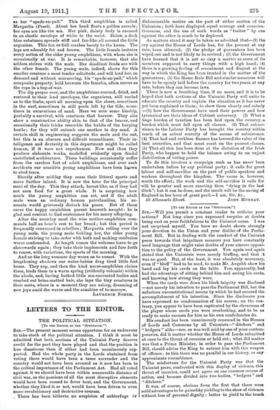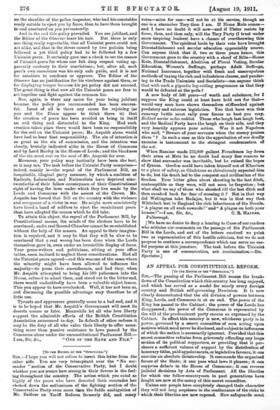LTD THE EDITOR OF THE " SPECTATOR...1
Sin,—Will you permit a constant reader to criticise your actions P Not long since you expressed surprise at doubts being cast on your faithfulness to the Unionist cause. I was not surprised myself. You have no doubt shown strongly your devotion to the Union and your dislike of the Parlia- ment Bill. But in dealing with the conduct of the Unionist: peers towards that iniquitous measure you have constantly used language that might raise doubts of your sincere opposi- tion to the policy of the Government. You again and again stated that the Unionists were merely bluffing, and that :t was no good. But, at the least, it was absolutely necessary, even if " bluff " had to be used, to make Mr. Asquith show his hand and lay his cards on the table. You, apparently, had had the advantage of sitting behind him and seeing his cards, and knowing how strong they were.
When the cards were down his black iniquity was disclosed —not merely his intention to pass the Parliament Bill, but the nefarious unconstitutional means by which he had secured the accomplishment of his intention. Since the disclosure you have expressed no condemnation of his course; on the con- trary, you appear to have been captivated by the cleverness of the player whose cards you were overlooking, and to be as ready to make excuses for him as his own confederates do.
His conduct has been unanimously censured in the Houses of Lords and Commons by all Unionists—" ditchers " and " hedgers " alike—nor, as was well said by one of your contem- poraries, did it matter whether the House of Lords submitted at once to the threat of coercion or held out ; what did matter was that a Prime Minister, in order to pass the Parliament Bill, should advise the King to entrust him with this weapon of offence : to this there was no parallel in our history, or any approximate resemblance. The misfortune for the Unionist Party was that the Unionist peers, confronted with this display of violence, this threat of coercion, could not agree on one common course of action, and became divided into two bodies, " hedgers " and " ditchers."
It was, of course, obvious from the first that there were solid advantages to be gainedky yielding to the show of violence without loss of personal dignity : better to yield to the touch on the shoulder of the police inspector, who had his constables ready outside to eject you by force, than to have them brought in and quartered on you permanently.
And in the end this policy prevailed. You are jubilant, and the Editor of the Observer tears his hair. But there is only one thing really regrettable, that all Unionist peers could not act alike, and that in the stress caused by two policies being followed a yet third policy had to be followed by a few Unionist peers. It certainly gave one a shock to see the names of Unionist peers for -whom one felt deep respect voting ap- parently contrary to their convictions ; but, after all, each peer's own conscience was his only safe guide, and it is not for outsiders to condemn or approve. The Editor of the Observer has no justification for his virulence against them, or for displaying temper because his pet policy did not succeed. The great thing is that now all the Unionist peers are free to act together and fight against the common foe.
Nor, again, is there any cause for your being jubilant because the policy you recommended has been success- fuL Least of all is there any cause for rejoicing (as you and the Times appear to think there is) that the creation of peers has been avoided as being in itself an evil thing and distasteful to the King. Had such creation taken place there would have been no responsibility for the evil on the Unionist peers ; Mr. Asquith alone would have had to bear that responsibility. The sin of intention is as great as the sin of commission, and the intention was clearly, brutally indicated alike in the House of Commons and by Lord Morley in the House of Lords ; and the blackness of the sin must rest on the soul of Mr. Asquith for ever.
Moreover, your policy may tactically have been the best, or it may not. The task before the Unionist Party comprises—. indeed, mainly is—the repeal of the Parliament Bill, an inequitable, illogical party measure, by which a coalition of Radicals, Labourites, and Nationalists have deprived nine- twentieths of their fellow countrymen of their Constitutional right of having the laws under which they live made by the Lords and Commons with the assent of the Crown. Mr. Asquith has forced that Bill on the country with the violence and arrogance of a victor in war. He might more consistently have hired a band of soldiers to eject the recalcitrant peers than have adopted the course which he did take.
To attain this object, the repeal of the Parliament Bill, by Constitutional means, the minds of the electors have to be convinced; and a real Second Chamber cannot be re-established without the help of the masses. An appeal to their imagina- tion is required, and it may be that they will be slow to be convinced that a real wrong has been done when the Lords themselves gave in, even under an irresistible display of force. Your press-writers and politicians, sitting at your office tables, seem inclined to neglect these considerations. Had all the Unionist peers agreed—and this was one of the cases where the minority might have been allowed to influence the majority—to press their amendments, and had they, when Mr. Asquith attempted to bring his 500 policemen into the House, refused to admit them, and stood out to the bitter end, there would undoubtedly have been a valuable object lesson. This you appear to have overlooked. Well, it has not been so, and discussing the possible advantage may therefore be of little use.
Tyrants and oppressors generally come to a bad end, and it is to be hoped that Mr. Asquith's Government will meet its deserts sooner or later. Meanwhile let all who love liberty support the admirable efforts of the British Constitution Association announced to-day. In default of other redress it may be the duty of all who value their liberty to offer some- thing more than passive resistance to laws passed by the Commons alone under the unconstitutional Parliament Bill.—
I am, Sir, &c., " ONE OF THE BANK AND FILE."



































 Previous page
Previous page